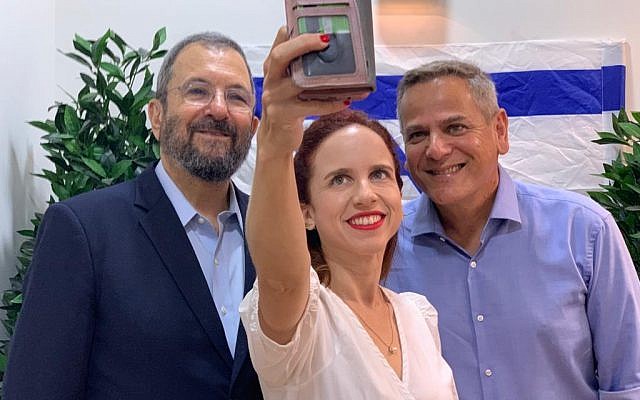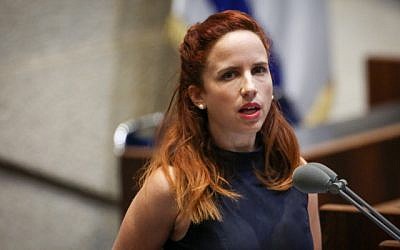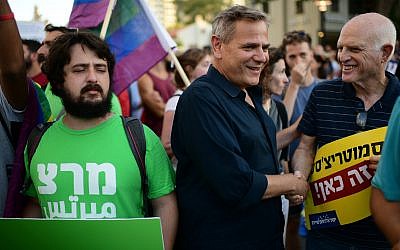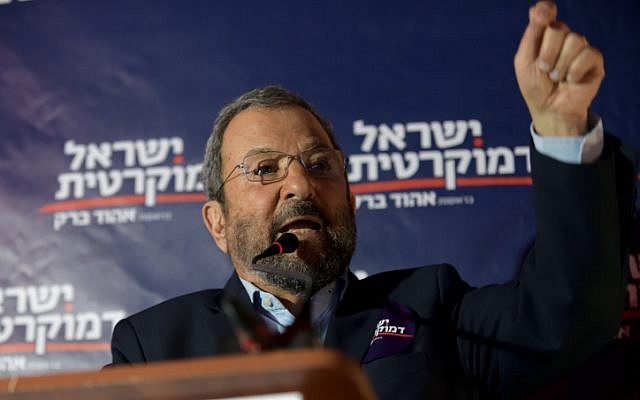Meretz head Nitzan Horowitz will head left-wing electoral list followed by Shaffir; Barak to take number 10 spot at his own choosing

The left-wing Meretz party will join forces with former prime minister Ehud Barak and recent Labor party defector Stav Shaffir for a united run in September elections, the three announced Thursday morning.
Newly elected Meretz leader Nitzan Horowitz will be at the top of the united faction’s slate, followed by Shaffir.
Barak, who is attempting a political comeback with the formation of his Israel Democratic Party, will be placed 10th at his own insistence, according to the statement.
Despite his low spot on the roster, Israel Democratic Party sources confirmed to The Times of Israel that Barak will be guaranteed the first pick of ministerial posts if the party, to be called the Democratic Camp, enters the government.
Most of the top 10 places on the list aside from Horowitz, Shaffir and Barak will go to Meretz lawmakers. Spots #7 and #9 are reserved for yet-to-be named Israel Democratic party members.
Shaffir had been an up-and-coming star in Labor, but in recent days had become vocally critical of party leader Amir Peretz’s decision to form a union with the more centrist Gesher party, ruling out mergers with Meretz or Barak.
A statement from the joint slate said Shaffir had been a major unifying force in the negotiations.

Creating a “‘democratic camp’ is the first and necessary step in the mission to bring the State of Israel back on track,” the three said in the statement.
The three will deliver a joint press statement on Thursday afternoon.
The joint run will avert a situation in which voters on the left would be forced to choose between Labor, Meretz and Barak, potentially leaving one of the three below the Knesset threshold and wasting thousands of votes. Activists have urged the parties to join forces in order to mount a strong a challenge as possible to Prime Minister Benjamin Netanyahu, who called elections after being unable to cobble together a coalition in May.

The announcement will likely put pressure on Peretz, who has come under fire from within his camp and across the left for his merger with Gesher leader Orly Levy-Abekasis.
Shaffir for days has criticized Peretz for ruling out mergers with other parties and hinted she may leave the party over it.
“In the current situation, one party or even two in our camp are likely to fall under the threshold,” Shaffir warned. “It is quite simply a danger to precious seats for the left that we must not allow.”

On Wednesday, Labor No. 2 Itzik Shmuli also criticized Peretz over the move, but did not say if he would leave the party.
Labor has been in decline for nearly 20 years. Its six-seat result in the last election was the worst in its 71-year history.
Barak was the last Labor leader to serve as prime minister, but split off from the party to remain in a coalition with Netanyahu’s Likud in 2011. His placement as 10th on the list will put his political future again in question, and reflects his sinking political stock after questions were raised over his past and his links to disgraced financier Jeffrey Epstein. Placing himself at number 10 could also quiet criticism that said he has only reentered politics to serve his ego.

Israel is set to hold fresh elections on September 17 after the April vote failed to produce a ruling majority coalition. Parties on both the right and left have been exploring merger deals as a way to ensure they pass the 3.25% electoral threshold.
As reported by The Times of Israel
